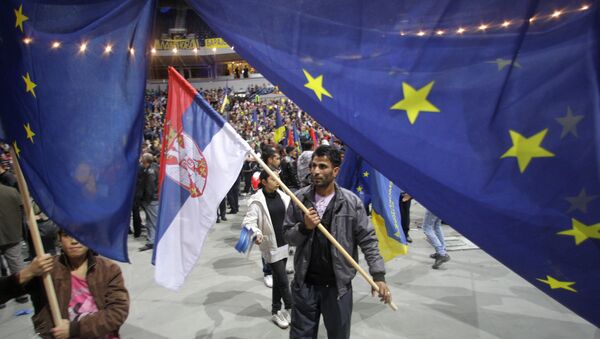Ever since the breakup of Yugoslavia began in June 1991, when member states Croatia and Slovenia declared independence from the confederation, the EU has been eyeing the region lustily, seeking to integrate the fallen country's constituent states as members within its own folds. Slovenia was the first to join in 2004, but it was only in 2005 the six other successor countries were formally recognized as candidates for membership — and it took until July 2013 for Croatia to become a fully-fledged member state.
Wow!
— Jasenko Selimovic (@jasenkos) June 13, 2017
"…accession of the Western Balkans is also in the own interest of the EU and it is more relevant than ever."https://t.co/fItqPqBlCU
As of June 2017, Montengro and Serbia are in negotiations to join the bloc (processes which started in 2012 and 2014 respectively), Bosnia and Herzegovina has applied for membership, and Macedonia is a considered a formal candidate for membership. While negotiations have not started, talks have been pending since 2005. Kosovo has not submitted an official application, but is considered a potential candidate in any event. In each country's case, different factors have served as barriers to accession.
Former Yugoslav Republic of Macedonia (FYROM)
The EU's beef with FYROM is comparatively trifling — successive Greek governments since the 1940s have objected to the country's name 'Macedonia', on the basis their northern neighbor "stole" it from the eponymous Greek province lying directly to the south of the Macedonian-Greek border.
While the EU has said the country has made "convincing progress" on police reform, tackling corruption and bolstering human rights, arguments over the country's nomenclature have served to impede the country's bids for EU and NATO membership for two decades. Hahn specifically referenced the issue when discussing Western Balkan accession, saying "new momentum" had been injected into the dispute, and if progress was made on the issue by Autumn, the EU would open accession talks.
2013 — US Senate Report- growing tensions between Bulgaria & #macedonia — Greece adding to problem on name
— Sasha Uzunov (@UZI9mmmm) March 12, 2017
Link: https://t.co/KuixF4id09 pic.twitter.com/IW9MLUgtnl
Bosnia and Herzegovina
While the EU is satisfied with Bosnia and Herzegovina's progress in four key areas — police reform, cooperation with the international war crimes tribunal, public broadcasting and public administration reform — the country's ongoing ethnic quarrels remain a worry the world over.
An EU peacekeeping force remains posted in the region, largely to protect resident Serbs from attack. The EU's official line is Bosnia remains blighted by an "unstable political climate" and ethnic divisions. Still, Hahn's comments suggest the Commission may be willing to look past these major issues in their quest to swallow the region.
Serbia
While not formally acknowledged, a major sticking point for EU leaders is Serbia's refusal to adhere to the officially mandated lines on Russia. The two countries enjoy a warm relationship, and Serbia has made clear it would never implement or accept anti-Russian sanctions, or change its policy of military neutrality and join a military alliance such as NATO, or the planned future EU Army. Despite Hahn's avowed willingness to look past other bones of contention with Western Balkan states as part of the bloc's enlargement push, independence on the question of Russian relations may be too bitter and vast a pill for EU leaders to swallow.
Kosovo
The breakaway territory of Kosovo is undoubtedly last in the queue to join the EU. The international community remains bitterly split over its 2008 declaration of independence, with many countries refusing to recognize it as a state in its own right. Among the "refuseniks" are five EU members — Spain, Greece, Romania, Slovakia and Cyprus.
Elections genuinely competitive but political will needed to address long-standing weaknesses, states EU Election Observation Mission Kosovo pic.twitter.com/AZMVD8qmme
— Henrik Nilsson (@ambnilsson) June 13, 2017
Moreover, EU leaders are concerned about hostilities directed at Kosovo's Serbian minority population — around 50,000, mainly clustered in the North. While Kosovo and Serbia alike have a formal policy of not impeding the other's EU membership bids, and Kosovo's government has granted a degree of autonomy to Serb-majority areas in the country, many frontline politicians are unhappy about the concession, and actively pledge to reverse it. For instance, Ramush Haradinaj, former field commander of the Kosovo Liberation Army and current leader of the Alliance for the Future of Kosovo party has said if his party prevails, there will be no place neither for Serbia nor for Serb municipalities in Kosovo.
Moreover, a 2013 EU investigation into the country's progress on reforms concluded not enough had been done to tackle human trafficking, or crack down on criminal gangs responsible for the smuggling of illicit drugs and weapons.



